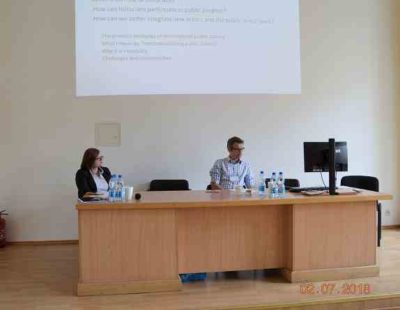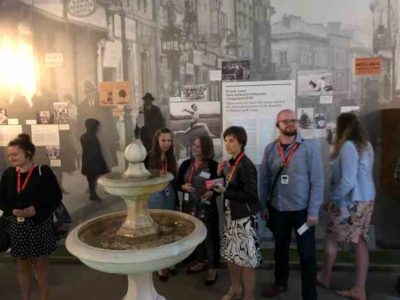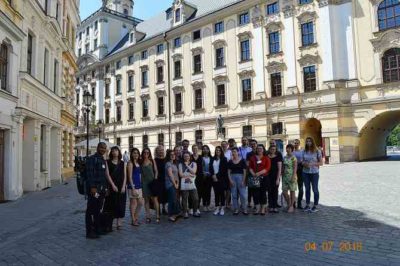Notes from the field: The University of Wrocław’s Public History Summer School
31 August 2018 – Malgorzata Rymsza-Pawlowka

Summer School organizer Dorota Wisniewska and keynote speaker Thomas Cauvin. Photo credit: Malgorzata J. Rymsza-Pawlowska
Author’s Note: Last month, I had the pleasure of attending the Public History Summer School, held in Wroclaw, Poland. The Summer School, which was co-sponsored with the University of Wrocław’s Historical Institute, the local Zajezdnia History Centre, the Jean Monnet Network for Applied Contemporary European History, and the International Federation for Public History (IFPH), ran for four days, and included presentations from scholars all over Europe and beyond. Topics—most of the papers were presented by graduate students and postdoctoral researchers—included everything from memorials and monuments in Ukraine, to the influence of communism on Polish foodways, to Danish Holocaust narratives. Scholarly panels were supplemented by roundtables, discussions, and a keynote by Thomas Cauvin, the president of the IFPH. In his talk, Cauvin traced the different stands of public history scholarship and practices abroad, arguing that international and transnational collaboration can enrich the wider field of public history. I came away from the Summer School very interested in learning more about public history abroad, and eager to speak more with the conference organizers. Joanna Wojdon and Dorota Wisniewska, along with their colleague Magdalena Gibiec, all of the University of Wrocław, organized this summer school. My interview follows.
Malgorzata J. Rymsza-Pawlowska (MJR): Tell us a bit about yourselves.
Joanna Wojdon (JW): I am an associate professor at the Institute of History, University of Wrocław and a deputy dean at the Faculty of Historical and Pedagogical Sciences. I hated history at school and found it boring and useless—until I started my own historical research. First, it was on the communist impact on school textbooks (recently published in English as Textbooks as Propaganda), and then on Polish American history. But I also wanted to change the popular notion of “boring history.” It brought me first to methodology of teaching history (and teacher training) and then to public history.
Dorota Wiśniewska (DW): I am a PhD candidate at the UWr and at the University of Versailles Saint-Quentin-en-Yvelines, Paris Saclay in the frame of joint international supervision of doctoral thesis (cotutelle). My ongoing research project is titled “Women in Politics in France and Poland in the Second Half of the 18th Century: A Comparative Study of Literary Salons and Correspondences.”
MJR: What is the state of public history (both scholarly and practice) in Poland and how do you think this relates to public history in the rest of Europe?
JW: Similarly to many European countries, public history is more often practiced than conceptualized, both in public history institutions and in academia. People do not know that what they do or research is public history. In some European languages, the very phrase “public history” (historia publiczna) does not sound very well and does not sell very well. This is the reason why there are programs such as “History 2.0” or “heritage in tourism,” but so far, only the University of Wrocław has an MA program in public history as such.
MJR: How did this Summer School come to be? What was the impetus and who was involved in the organization? What were your goals?
DW: Our aim was to discuss public history and public history training in an international milieu. We also wanted to check whether young historians are interested in public history. Last but not least, the summer school is meant to be an opportunity to get to know the university and our new Public History MA program, to be taught in English.
MJR: How did you come to arrange the program? How did you balance speakers, panels, and guest lectures?

Summer School participants visit Wrocław’s Zajezdnia History Centre. Photo credit: Malgorzata J. Rymsza-Pawlowska
DW: We received many more proposals than we could accept, which forced us to make some very difficult choices. Eventually, we agreed on the following themes: material culture, emotive exhibitions, people and museums, politics of memory, history in literature, history and new media, and oral history. Alongside presentations of individual research projects, we proposed two lectures: one on internationalization of public history, delivered by Dr. Cauvin, and the other on (public) digital history by Prof. Jane Winters. In our view, both perfectly fit into the program due to the international character of the summer school and the importance of new technologies in today’s world. On the second day, we went outside the university to the Zajezdnia History Centre, where we organized a roundtable, “Why public history.” On the last day, Dr. Chantal Kesteloot and Dr. Paweł Ukielski reflected on the permanent exhibition in the recently opened House of European History in Brussels, which has been causing many controversies ever since it was opened.
MJR: What were your takeaways from the Summer School? Anything surprising?
DW: If I was surprised about something, undoubtedly it had a positive dimension. The fact that we were from different countries (fifteen states, mostly Europe but also North America and Asia) permitted us to discover and better understand public uses of the past in other societies and contexts. The interdisciplinarity of the summer school was also an advantage; some participants specialized not in history, but in cultural studies, sociology, religious studies, or literature.
Although we have not worked out a clear definition of public history, we all better see what the famous phrase (“for the people, by the people, with the people, and of the people”) means. Personally, I am even more convinced now that history programs at universities should evolve and one of the steps on the way to “modernization” may be public history. Academic training was for a long time shaped (in many cases still is) to equip students with skills suitable for pursuing academic careers, which is no longer an option for all graduates or even PhDs, whereas public history opens new possibilities.
MJR: What is the importance of an international model of public history? How do you hope to collaborate with partner programs, and what are next steps?
JW: The very process of developing the international model of public history is fascinating. We learn a lot from other countries’ experiences. Internationalization should also strengthen the position of public history in academia.
There are so many opportunities for collaboration: developing our summer school, continuing staff and student exchange, establishing more formal cooperation within the EU (or other) funding schemes, internationalizing open seminars in public history, and more.

Summer Institute Participants at the University of Wrocław. Photo credit: Malgorzata J. Rymsza-Pawlowska
DW: We are already looking forward to organizing the next summer school in 2019. Now, we are seeking to organize a five to six day long event, so that we could do much more and get to know each other better. We do hope that the next Public History Summer School will be as inspiring, motivating, and enjoyable as the first one. The CFP will be announced in January on our website.
~ Malgorzata J. Rymsza-Pawlowska is the director of the graduate program in public history and an assistant professor in the department of history at American University in Washington, D.C.



